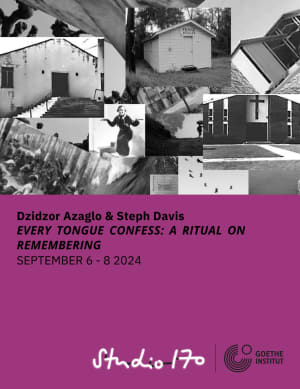Dzidzor Azaglo & Steph Davis: Every Tongue Confess: A Ritual On Remembering
Saturday, Sep 07, 2024 6:00p -
8:30p
Where:
Goethe-Institut Boston
170 Beacon Street
Boston, MA 02116
Admission:
FREE
Categories:
Art, Kid Friendly, Meetup, Music
Event website:
https://www.goethe.de/ins/us/en/sta/bos/ver.cfm?event_id=25896351
Goethe-Institut Boston’s Studio 170 for Artists residency program presents its second artists-in-residence of 2024 featuring marimbist, composer, Africana studies scholar, and cultural activist Steph Davis and the Ga-Ewe folklore performing artist Dzidzor Azaglo (pronounced Jee-Joh), who creates immersive experiences that grounds the audience in their own bodies. They present their performance and installation “Every Tongue Confess : A Ritual on Remembering,” developed specifically for the Goethe-Institut space in Back Bay.
An invitation to listen closely, “‘Every Tongue Confess,” is an evening-length performance and multifaceted installation inspired by Zora Neal Hurtson folktales. Throughout a multimedia installation, physical space becomes a container for memory and healing, and reflection about “how it feels to be here on earth or leaving, or about the sweet pain of hanging on between the coming and going.” (Hurston, 2001) Collected in the late 1920s, Every Tongue Got to Confess is the third volume of folk-tales from the celebrated author of Their Eyes Were Watching God. Born on Jan. 7, 1891, in Notasulga, Alabama, Hurston moved with her family to Eatonville, Florida, when she was still a toddler. Her writings reveal no recollection of her Alabama beginnings. For Hurston, Eatonville was always home.
Dzidzor’s ability to collage live poems and soundscapes from speakers, sermons, and nature, combined with Steph Davis’ ability to stir, evoke, and shape the complexity of humanity through the marimba, is a merge of artistic innovation and profound storytelling — a glitch, a disruptive tapestry of memory and confession. The audience is invited to participate as witnesses through the practice of listening closely (Hurston, 2001), call and response, and embodiment.
The performance will weave themes of freedom, spirituality, healing, and pain through visuals, sound, and movement inspired by traditional African/African-American practices. The performance forges a space to manipulate time and disrupt the sonic environment of colonialism. We invite the audience to sit with the discomfort and wonder of the dead, the living, and beyond —as we honor traditions of possibility, resilience, collective care, liberation, and truth-telling.
September 6th
6:00-9:30 PM Installation Opening
September 7th
4:00 PM Installation is open
6:30 PM Doors open, Reception
7:30 - 8:30 PM Live Performance
September 8th
12:00 PM Installation is open
1:00-2:00 PM Postures of Prayer: A Performance Ritual
2:30-3:30 PM Panel Discussion with guests
-

SponsoredEarth Day n Night - A 12 Hour Indie Music, Art & EDM Experience
Saturday, Apr 26, 2025 1:00p
The Great American Beer Hall
-

Sponsored -

SponsoredLocal Literary Journal Warehouse Launch Party
Friday, Apr 25, 2025 7:00p
Life Drawing Boston Studios
-

SponsoredGood Morning Newbury Street, with coffee!
Saturday, Apr 26, 2025 9:00a
Outside the Newbury Hotel entrance
-

Sponsored -

Sponsored -

Sponsored -

Sponsored


